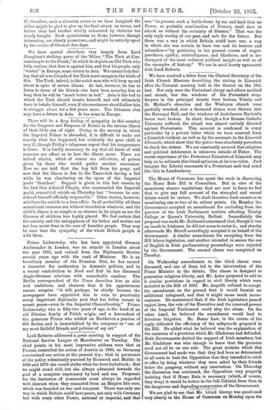On Wednesday amendments to the third clause were discussea, and
one of them led to the intervention of the Prime Minister in the debate. The clause is designed to guarantee religious liberty, and Mr. Astor proposed to add to it similar provisions in regard to civil liberty which were included in the Bill of 1893. Mr. Asquith refused to accept the amendment, on the ground that it would furnish no additional safeguard, and that it might cause much incon- venience. He maintained that, if the Irish legislature passed unjust laws, the veto of the Executive and the reserved powers of the Imperial Parliament could stop the abuse. On the other hand, he believed the amendment would lead to frivolous litigation. Mr. Bonar Law, in the course of his reply, ridiculed the efficiency of the safeguards proposed in the Bill. He added what he believed was the explanation of the omission of a provision which Mr. Gladstone had defended. Both Governments desired the support of Irish members, but Mr. Gladstone was wise enough to know that the pressure need not all be on one side. The great mistake which this Government had made was that they had been so determined at all costs to beat the Opposition that they intended to stick to office by doing whatever they were asked by their friends below the gangway, without any reservation. On Thursday the discussion was continued, the Opposition very properly insisting that if Home Rule is necessary (which, of course, they deny) it would be better in the full Colonial form than in the dangerous and degrading compromise of the Government.


















































 Previous page
Previous page